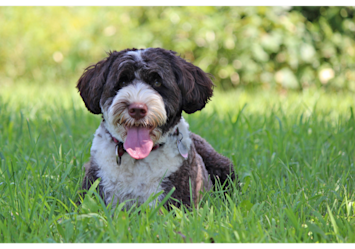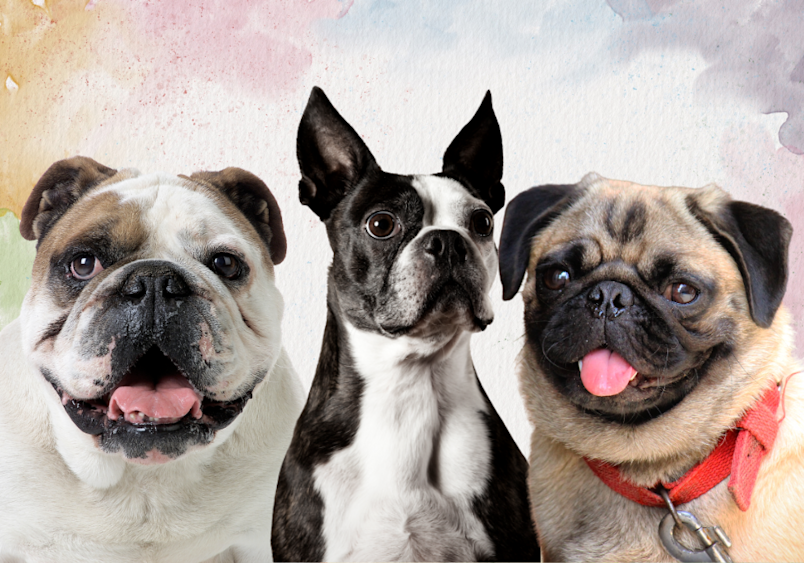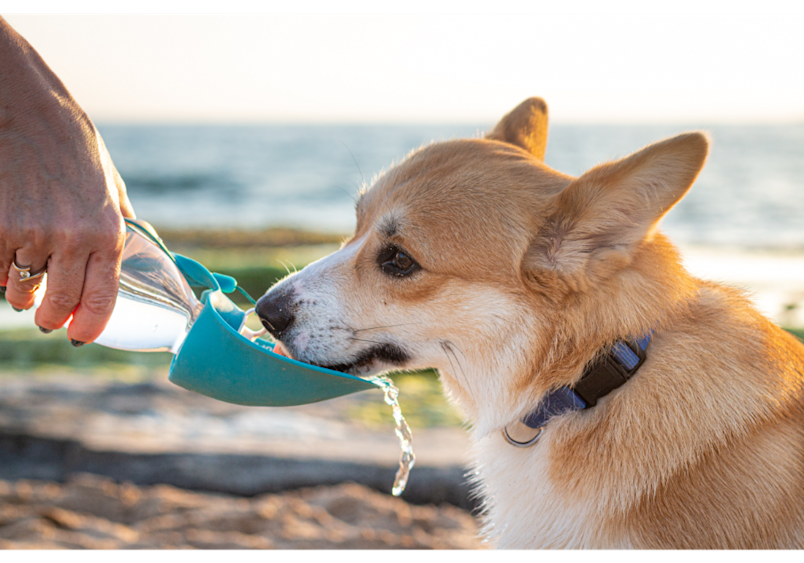
Your gut feeling as a dog parent is incredibly powerful, especially when it comes to subtle health changes. So, have you ever wondered "why does a dog pant so much?" while watching your furry companion breathe heavily after a walk? It's normal for dogs to pant when they are hot or excited, but what if your dog is panting excessively or constantly?
Understanding why your dog is panting and recognizing when to worry can help your furry friend stay healthy and comfortable. Whether you're dealing with puppy panting or just wondering "why is my dog constantly panting?", get ready to become a dog panting detective! Let's dive into when your pup's heavy breathing is totally normal versus when it's time to spring into action!
What Are the Common Causes of Dog Panting
Panting can stem from normal everyday activities or signal underlying health issues. Here are the most common reasons:
Dog Panting Due to Overheating
Ever wonder why your dog turns into a panting machine after playtime? It's because they're basically wearing fur coats all day and can't take them off!
Unlike us, dogs can't sweat to cool down - they only have tiny sweat glands on their paw pads, so panting becomes their primary cooling method. They pant like crazy to let heat escape through their mouth and tongue. It's their version of turning on a fan.
After a game of fetch, a walk on a warm day, or even just getting excited, all that huffing and puffing is completely normal. Your dog is just doing what they need to do to avoid overheating. Think of panting as their natural way of saying "I'm hot and need to cool down!"
Puppy Panting Because of Excitement and Stress
Your dog doesn't just pant when they're hot; big emotions can make them huff and puff too! Thunderstorms, fireworks, car rides, or even exciting visitors can all trigger stress panting. You'll probably notice other signs like wide eyes, pacing, or drooling along with heavy breathing.
The good news is that this kind of panting usually stops once your pup calms down or you remove them from whatever is stressing them out. It's just their way of dealing with overwhelming feelings.
Nighttime Dog Panting
Nighttime panting can worry pet parents, but it's usually just your dog having vivid dreams. Dogs start dreaming about 20 minutes after falling asleep and might be chasing squirrels or playing fetch in their sleep, which can cause real panting, leg twitches, or soft barks.
Dog Panting Based on Breed & Age
Some breeds are natural heavy breathers because of how they're built. Short-snouted dogs like Bulldogs, Pugs, and Boston Terriers have squished faces and narrower airways, so they pant more even when they're just chilling. It's like trying to breathe through straw. They have to work harder to get air. These flat-faced pups might sound like they just ran a race even when they're relaxing, which is totally normal for them.
Age plays a role, too. Puppies naturally pant more from excitement and energy, while older dogs might pant due to health issues that come with age. The important thing is knowing what's typical for your dog so you can spot when something's off.

Medical Causes of Excessive Panting
In addition to normal causes, several medical conditions can cause abnormal or persistent panting:
Pain and Discomfort: Dogs pant when they're hurting, even if you can't see what's wrong; it's their way of dealing with pain.
Heat Stroke: This happens when your dog gets way too hot and their body can't cool down properly—think being stuck in a hot car or playing too hard on a scorching day.
Poisoning: If they eat something bad like chocolate, grapes, or cleaning products, their body goes into overdrive trying to deal with the toxins.
Ongoing Health Issues: Things like heart problems, hormone imbalances, or lung troubles make it harder for them to breathe normally all the time.
Not Enough Healthy Blood: When your dog's blood can't carry oxygen properly, they have to work extra hard to get enough air to their body.
Can Panting Be an Emergency Warning Sign?
Getting to know your dog's normal breathing helps you spot trouble before it gets serious. Most dogs breathe about 15 to 35 times per minute when they're just chilling on the couch, but your pup might be different.
Here's a simple trick: when your dog is totally relaxed (maybe during their afternoon nap), count how many times their chest goes up and down in a minute. Normal breathing should look easy and steady, not like they're working hard at it.
When Is My Dog Panting an Emergency?
Panting after zoomies around the yard or on a hot summer day is just your dog being a dog.
However, some panting situations are red flags that need immediate attention:
Rapid breathing while at rest: Your dog is breathing very fast even though they are just lying around and haven't been active.
Unusual or alarming sounds: You hear strained, raspy, rattling, or gurgling sounds accompanying their panting, or if it sounds like they are wheezing, gasping, or choking.
Nonstop panting without cause: Your dog is panting continuously for no apparent reason (e.g., not hot, not excited, not after exercise).
Panting with coughing: Your dog's panting is accompanied by coughing.
Sudden exhaustion or lethargy: Your normally energetic dog is suddenly acting exhausted or unusually tired.
Intense panting out of nowhere: Your dog starts panting intensely and rapidly without any obvious trigger.
Panting with vomiting or collapsing: Your dog's panting is combined with vomiting or a sudden collapse.
Suspicion of poisoning: If you suspect they got into something toxic, don't hesitate to seek immediate veterinary help.
Discolored Gums or Tongue! This is the biggest warning sign and requires immediate veterinary care. Your dog's gums and tongue should be pink like yours. If they are blue, purple, or white, it means your dog isn't getting enough oxygen and needs emergency attention right now! Get to the vet immediately!
You know your dog better than anyone. If your gut tells you something's not right, trust that instinct and seek help.
What to Do When the Dog Keeps Panting Excessively
Beyond prevention, knowing what to do during emergencies is important. When your dog is in trouble, every second matters. Here's what to do right now:
1. Call Your Vet or Emergency Clinic FIRST: No matter the cause, if your dog is panting excessively or showing any of the red flag signs, call your veterinarian or nearest emergency animal hospital right away. Describe your dog's symptoms so they can prepare for your arrival and give you immediate guidance. Staying calm and speaking in soothing tones will help keep your dog calm too.
2. Address Specific Situations While Awaiting or En Route to Vet Guidance:
For Suspected Overheating:
Immediately move your dog to a cooler environment: indoors with AC, under shade, or even in your car with the air blasting.
Apply damp (not icy cold) towels to their paw pads, belly, and inner legs to help cool their blood.
Offer small sips of cool water only if your dog is conscious, not actively vomiting, and can swallow without difficulty.
For Suspected Breathing Problems
If their gums or tongue are blue, purple, or white, this is a life-threatening emergency. Get to the vet immediately.
Keep them as calm and comfortable as possible. Don't restrict their movement if they're trying to find a position that helps them breathe.
For Suspected Poisoning:
If you think they ate something toxic, follow the guidance from your vet or a pet poison control hotline (like ASPCA Poison Control).
Do not try to make them vomit unless specifically instructed to do so by a veterinary professional. Bring any packaging of what they might have ingested to the clinic.
Pet Insurance for Excessive Dog Panting
Nobody expects their dog to start panting like crazy out of nowhere, but when it happens, vet bills can add up fast! Emergency visits, X-rays, and treatments for breathing problems like heart disease or heat stroke can easily cost hundreds or thousands of dollars.
With Embrace dog insurance,, you don't have to choose between your dog's health and your budget. Get some help handling those unexpected respiratory emergencies. Pet insurance can help with the costs of emergencies as well as ongoing treatments, plus you can choose to even include prescription medications for chronic conditions like heart disease that cause dog panting.
Consider adding a wellness plan to reimburse you for check-ups where your vet can learn your dog's normal breathing patterns and catch any problems before they become more serious.
Protecting your dog's health shouldn't mean financial stress.
Simple Ways to Prevent Excessive Dog Panting
Stop them before they even start! Smart prevention means targeting the specific situations that can put your pup in breathing trouble:

Hot Weather Protection: Never leave your dog in the car (even with windows cracked), avoid walks on scorching pavement that can burn their paws, and always bring a collapsible water bowl on summer adventures.
Stress Prevention: If your dog gets anxious during thunderstorms or fireworks, create a safe space ahead of time with their favorite blanket and maybe some calming music.
Flat-Faced Breed Care: For breeds with shortened snouts mentioned earlier, use a harness instead of a collar to avoid putting pressure on their already-compressed airways and keep them indoors during heat waves since they overheat much faster than other dogs.
Remember: most of the time, panting is just your dog being totally normal, whether they're cooling down from playing or getting excited about treats. But nobody knows your dog like you do, so if something feels wrong, it probably is. You're not overreacting, you're just being an awesome dog parent who might catch a problem early. That's exactly what good pet parents do!